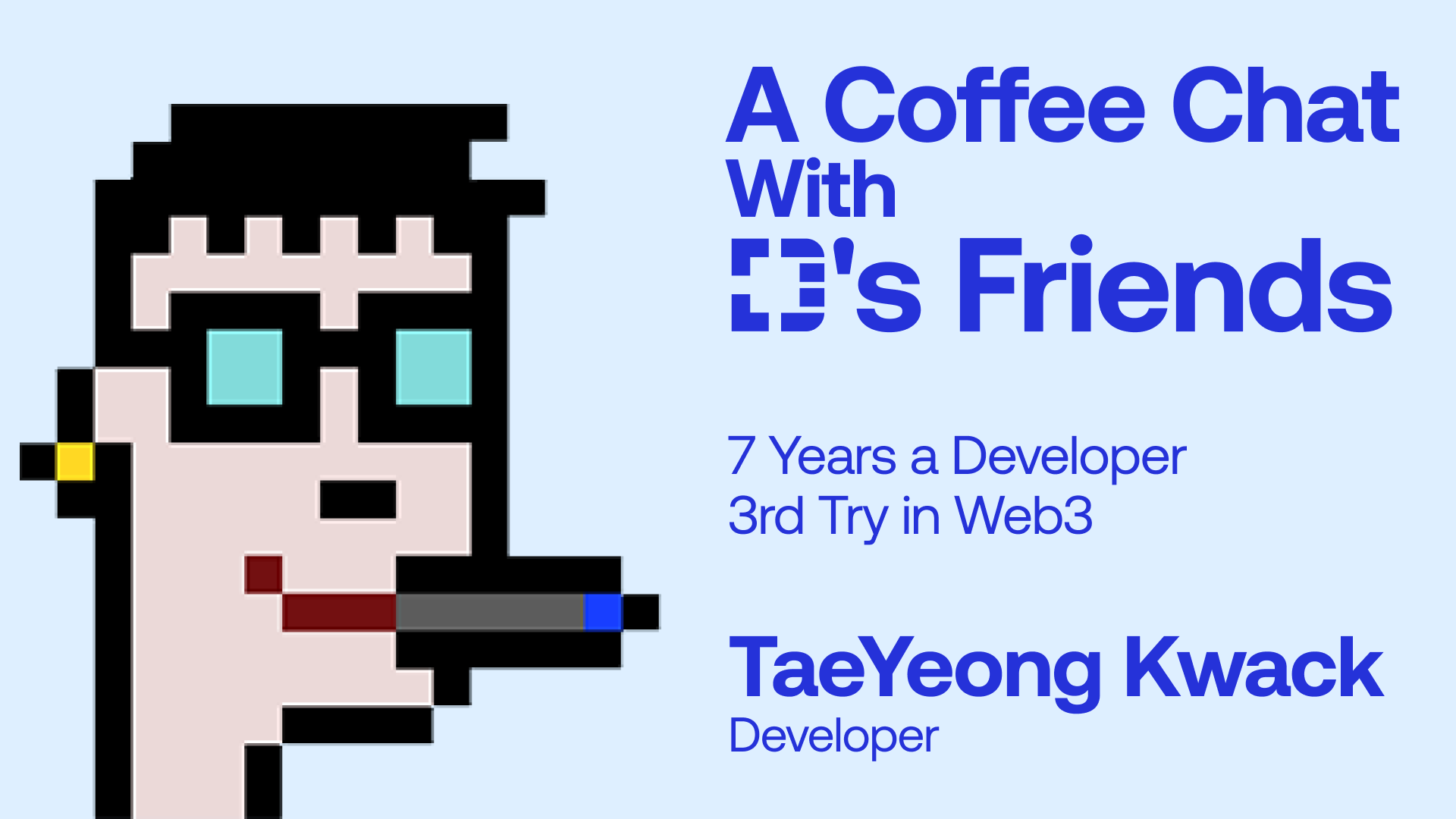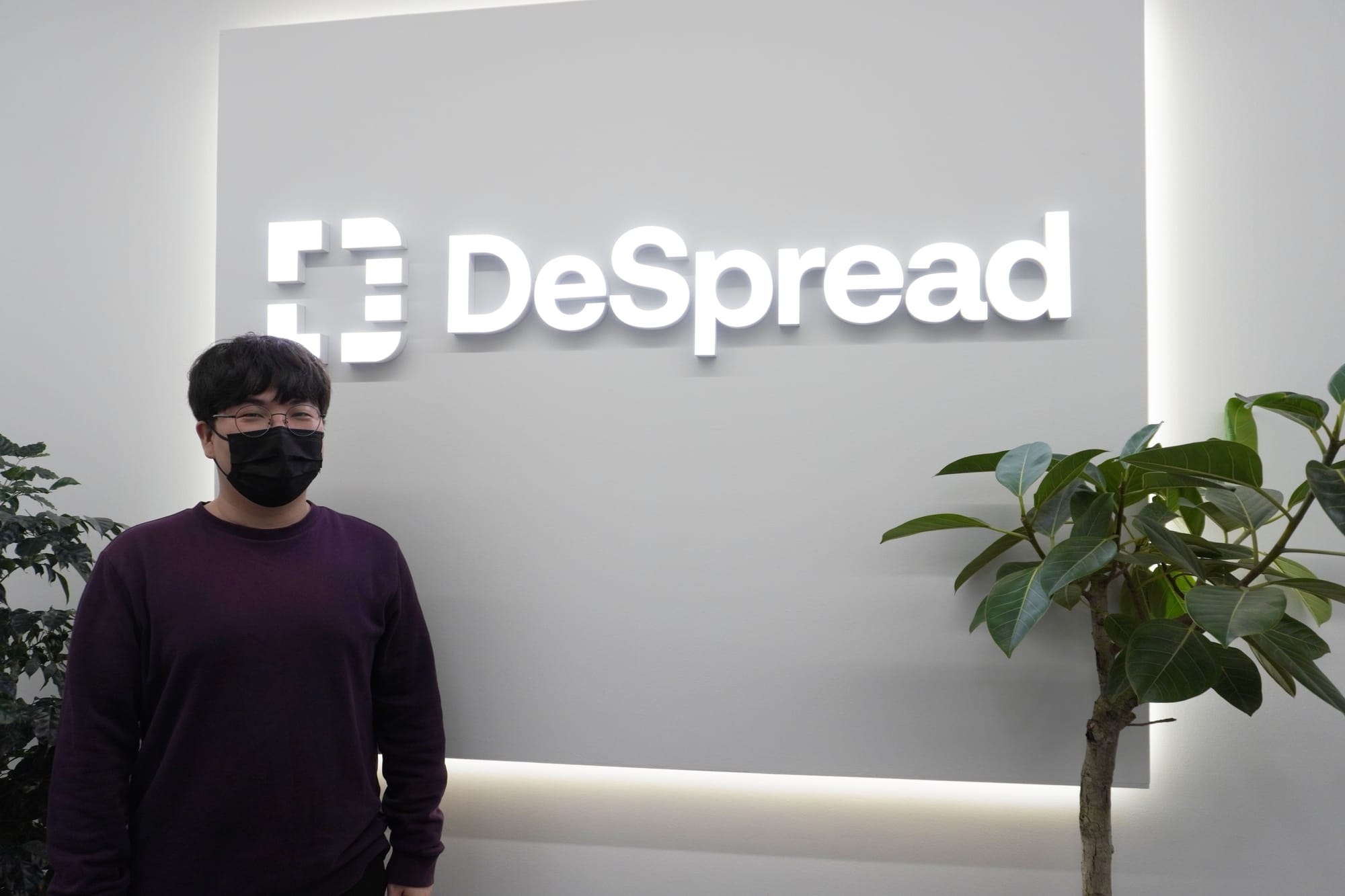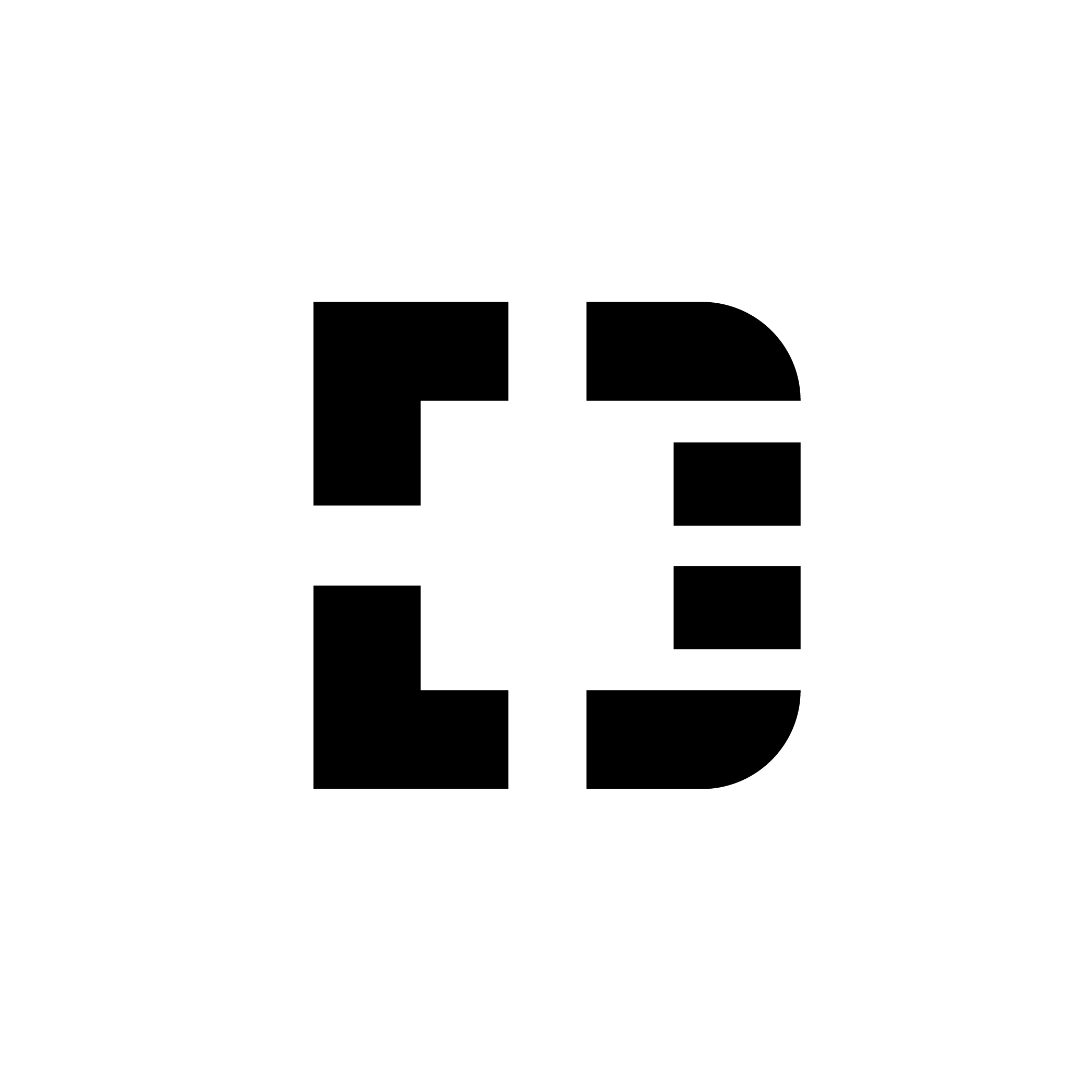
A Coffee Chat With D's Friends I TaeYeong Kwack / Developer
This time, we sat down with TaeYoung Kwak to talk about what it's like to be a Web3 developer and why he's taking on the Web3 industry for the third time.

“7 Years A Developer 3rd Try in Web3”
**Disclaimer) The opinions expressed in this interview are those of the interviewer and do not represent the official statement of DeSpread.
Hello, I'm Eunji Cho at DeSpread. DeSpread is a company of “Degens” who are immersed in the Web3 industry. Each of our coworkers has a unique personality, but we share the same DNA: a genuine love for Web3. We work in a free-spirited atmosphere, but we’re all professionals in our respective fields.
Last time, we interviewed Jeehyun Ham(ZZoha), the PR lead for our 8th Coffee Chat with D's Friends. This time, we sat down with TaeYoung Kwak to talk about what it's like to be a Web3 developer and why he's taking on the Web3 industry for the third time. TaeYoung is a self-taught developer who has been working in development for 7 years, but his major is different from his career - he majored in design! With such a unique background, you might be curious to know what he does at Despread.

Eunji: Could you please introduce yourself?
I'm TaeYoung Kwak, a developer. I have been a developer for about 7 years and have been working as a full-stack engineer for many years.
I joined Despread about two months ago and am working on the project '3ridge', an on-chain growth and data analytics platform. At work, I go by the nickname Livet, which is my English name.”
Eunji: What did you do before joining DeSpread?
“I began my development journey as a self-taught individual, building a career as an application and IoT developer. Alongside my work, I pursued web development through self-study. Later on, I ventured into freelancing as a web developer, gradually building a career in this field.
The majority of my career has been in the startup environment. I stayed in startups because I appreciated the culture of collectively brainstorming and attempting various approaches to elevate a project to its best possible outcome.
Before joining DeSpread, I worked in the Web3 industry, but due to issues in company management, I couldn't stay for an extended period.
My initiation into the Web3 career began with a fintech company called Chai. There, I was responsible for developing a program that managed the company's service transactions using blockchain, specifically creating a system for payments. However, at that time, the company faced severe damage to its corporate brand due to the Terra-Luna Crash, leading to the cessation of Chai's services for management reasons. Consequently, I left the company.
Afterward, I briefly worked at Blockcrafters, where I developed a DeFi project as part of a new business initiative. Unfortunately, due to managerial reasons, I couldn't continue my employment, especially at the point nearing the release of the beta version.
Around this time, Jason, the co-CEO of DeSpread, reached out to me with a cold email (proposal email), and thanks to that, I found the opportunity to embark on a new challenge in the Web3 space with DeSpread.”
Eunji: How did you get into the Web3 industry?
“I came across blockchain when I read a post about someone purchasing a pizza with 10,000BTC. Although I had heard sporadically about blockchain and crypto since then, I never thought about entering this industry.
Later, I went for an interview at Chai, and the interviewer mentioned, ‘This is the company that created Luna.’ That's when I first learned that this company was involved in crypto. Once I joined, I discovered that the company had a significant interest in crypto. Unfortunately, due to various circumstances, I couldn't continue with the project I was assigned.
However, working at this company allowed me to build diverse skills and domain knowledge. While I couldn't continue with the project, I want to utilize these skills in the industry and contribute more to it.”
Eunji: Why did you choose DeSpread within Web3?
“I initially entered the Web3 industry with Chai, but both Web3 companies I worked for had management issues. So, after leaving the second company, I had planned to exit this industry.
However, what appealed to me about DeSpread is that, unlike the Web3 companies I worked for, it is a Web3 consulting firm, allowing me to approach the business aspect indirectly.
As someone who enjoys startup culture and has considerable experience working at various startups, I am confident that working at DeSpread would be the most upside opportunity. Additionally, I find the opportunity to join DeSpread Labs at its early stages appealing. Joining as a founding member, I believe I can become an influential leader in this market at this critical juncture.”

Eunji: What do you do at DeSpread?
“I’m currently involved in a project called 3ridge. While my main responsibility lies in project development, I am also actively engaged in discussions to improve the overall efficiency of DeSpread team members’ tasks by providing effective tools. For example, I have been exploring ways to streamline the process of report sending, which currently takes half a day for members of the marketing team. I am working on finding solutions to make this process more efficient so that team members can perform their tasks more effectively.”
Eunji: What is the main feature or recent update that 3ridge is currently actively developing?
“Recently, we have developed the email signup and login feature. As 3ridge aims to be a Web3 onboarding platform, we strive to make it convenient for users who may not be familiar with Web3 to easily use the platform. For instance, we are working on solutions to ensure that users without wallets like MetaMask or those who have never used them can still comfortably use 3ridge.
Additionally, we are putting efforts into enhancing the user experience for upcoming quests, making them more accessible and enjoyable. Paying attention to even the smallest details is crucial, as it can significantly improve user convenience.
Furthermore, we plan to utilize the data generated from various services, including quest events, to derive diverse insights and provide them to users.”
Eunji: I’m also curious about the differences between frontend and backend!
“As you can infer from the words, it is easy to understand if you think of a developer responsible for the front and back of a program.
The frontend constructs pages that users see, such as a homepage. It involves developing how the next screen appears when a user clicks on a specific button on the homepage from a UI/UX perspective. So, in addition to creating well-designed pages, it also involves thinking about how to present data quickly and easily for a better user experience.
The backend is the area not exposed to the user. While the frontend is responsible for constructing the visible pages, the backend handles the process of storing or retrieving data from behind the scenes.
For example, when a user signs up on a portal site, the frontend develops the scene of showing the user inputting information on the signup page. The backend, on the other hand, develops processes like storing the information (data) the user entered and later retrieving it.
As a side note, in the past, people used to learn both frontend and backend without distinction and worked in dual roles. However, nowadays, it is more common to specialize in one area and build a career in that field.”
Eunji: Are there any differences between the frontend and backend development roles in Web 2 and Web 3?
“There doesn’t seem to be a significant difference, but if we have to point out, it seems that Web 3 frontend developers have more tasks compared to Web 2.
In the realm of Web 3, frontend developers have the responsibility of directly storing data on the blockchain, often referred to as a 'decentralized app (dApp)' due to the decentralized nature of the web. In other words, the frontend is simultaneously playing the role of the backend.
To elaborate further, generally, to perform activities on the on-chain, users need to use gas fees (transaction fees). When a user presses a button using the dApp, a transaction occurs, accompanied by the incurrence of gas fees. This process is somewhat analogous to the 'data storage' role of a Web 2 backend developer, but in Web 3, frontend developers handle this process.”
Eunji: You have had a long career in development relative to your age. I’m curious about the reason you started development early!
“I have always enjoyed planning my life since I was young. During my middle school years, I had many considerations about my future career and often pondered over ‘which field I could excel in’. At that time, I was deeply immersed in development, and I decided to explore this field more thoroughly. From then on, it seems I dedicated myself to studying development.
As a student back then, I thought that theoretical content taught in academic settings and the practical information used in real-world scenarios were quite different. I believed that learning through practical experience in the industry would be more pragmatic. So, instead of spending time on theoretical studies like academic courses, I was convinced that gaining hands-on experience ahead of others would bring more opportunities. Looking back, it seems that building a career in development early on has indeed acted as an advantage for me.”
Eunji: You have been developing for a long time, what has been your biggest challenge?
“Regardless of the profession, continuous learning is essential to avoid falling behind, but in the field of development, especially nowadays, where things change rapidly, and trends shift, it seems that one needs to study even more.
Personally, I tend to struggle with organizing and summarizing what I learn and experience. This aspect appears to hinder the effective utilization and refinement of the strengths inherent in the role of a developer.
As an aside, the most challenging period for me was around 2017 when I was starting to build my development career. Nowadays, developers are often well-treated and enjoy positive attention, but back then, there were many overnight shifts and the pay was at the minimum wage. Looking back, it was indeed a tough time for me.”

Eunji: You have built your career experience in the field of development, but I understand that your university major was in visual design. What was the reason for choosing a different major?
“I started working before entering university. As mentioned earlier, I valued ‘practical experience’ more than theory, so I wanted to learn something I could enjoy as a hobby while majoring in it.
I have been drawing as a hobby since childhood, especially enjoying sketching or incorporating design elements. Therefore, I decided to major in visual design with the goal of ‘learning while enjoying drawing’.
Fortunately, my major in visual design proved to be very helpful in practical development work. Front-end developers often interact with designers in their work, and occasional conflicts can arise in that environment.
I believe these situations occur because there is a lack of mutual understanding. Developers and designers use different tools and have learned different things throughout their careers.
However, since I could simultaneously do both development and design, communication with designers was smoother. As a developer who has learned design, I was able to understand the language of designers during the collaboration process, and I could propose feedback more convincingly.”
Eunji: I understand that you lived in Russia for a while. Did your experience of residing abroad contribute to entering the Web3 industry?
“It seems that my international experience didn’t provide significant advantages for entering the industry. However, it has given me a broader perspective compared to others. Thanks to this, I have no fear of expanding globally, and it has become an opportunity for me to have a unique perspective in my work.”
Eunji: Do you have any current work- related concerns or issues?
“I’m trying to figure out how to be a contributing coworker at Diffuse. I want to be recognized and trusted within the company, and I'm trying to figure out how to communicate what I do. I want to be the ‘go-to person’ that my teammates need me to be, because I think that if they know what I do, there will be opportunities for collaboration and so on.”
Eunji: Do you have any goals you want to achieve at DeSpread in the future?
“I want to create an organization that can produce the best results. I am contemplating how, as a developer, I can help improve the efficiency of my team members within the company.
I want to contribute to making our company, DeSpread, a place that can attract and bring in skilled and capable individuals in the industry.”

DeSpread’s Mission
DeSpread provides refined perspective for web 3 pioneers.